



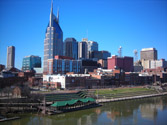

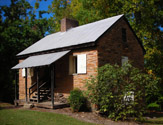









Southern Exposure
Mitch Landrieu
Uniting Louisiana Behind a Single Desire
Uniting Louisiana Behind a Single Desire
From the flooding of New Orleans to the intense heat that bore down on the city as some residents remained trapped in attics and on rooftops following the onslaught of Hurricane Katrina, nature's wrath was seemingly unfettered, indiscriminate and merciless. Today, a number of neighborhoods are still struggling to rebuild. Everything from the initial Federal Emergency Management Agency (FEMA) response to the hotly contested legal disputes over insurance policy coverage has stood in the way of some New Orleanians regaining a sense of normalcy or moving on with their lives. Thousands have been dramatically impacted by the loss of their homes and the effects of the storms on the New Orleans economy cannot be overlooked. Small "Mom and Pop" businesses, large companies and even entire industries have been adversely affected.
In spite of the trying circumstances, New Orleans is moving forward and is expected to fully recover . . . just not right away. The Crescent City is supported largely by tourism and convention dollars, and one of the city's biggest challenges has been to persuade travelers to return. Louisiana's political and business leaders understand how vital the tourist and convention trades are to the economy of New Orleans (and to their state, for that matter). They have responded with advertising campaigns and strategic plans, endeavoring once again to find favor among leisurely vacationers and conventioneers.
While great strides are being made, particularly in the tourism sector, some have speculated that New Orleans might be ill-prepared to regain its pre-Katrina status as a convention mecca. Quite frankly, the bad press that has accompanied some of the rebuilding efforts hasn't helped matters. Many fear that some business might be lost to cities like Atlanta. In fact, Microsoft Corporation, citing concerns over air service to New Orleans-Louis Armstrong International Airport, recently cancelled several meetings it had planned to hold in the Big Easy in October 2007. Realizing that much work remains unfinished, New Orleans' leaders are acutely aware that they must act decisively and effectively if the city is to re-eastablish itself as one of the nation's premier tourist and convention destinations.
In spite of some roadblocks, New Orleanians are diligent, strong, resilient and determined to see their great city through. For these folks, life goes on even though some outsiders have written off the city and major media outlets haven't always cast New Orleans in the best light. The tireless labor of everyday citizens and the collective efforts of Louisiana's politicos (whose job security could hinge on whether they successfully play their part in revitalizing storm-affected communities) will ensure that New Orleans is rebuilt and its spirit is revived. The utilization of millions of dollars in federal funds and the implementation of plans designed to make Louisiana and New Orleans better for the long-term also fuel the mostly unreported optimism New Orleanians share.
In spite of the trying circumstances, New Orleans is moving forward and is expected to fully recover . . . just not right away. The Crescent City is supported largely by tourism and convention dollars, and one of the city's biggest challenges has been to persuade travelers to return. Louisiana's political and business leaders understand how vital the tourist and convention trades are to the economy of New Orleans (and to their state, for that matter). They have responded with advertising campaigns and strategic plans, endeavoring once again to find favor among leisurely vacationers and conventioneers.
While great strides are being made, particularly in the tourism sector, some have speculated that New Orleans might be ill-prepared to regain its pre-Katrina status as a convention mecca. Quite frankly, the bad press that has accompanied some of the rebuilding efforts hasn't helped matters. Many fear that some business might be lost to cities like Atlanta. In fact, Microsoft Corporation, citing concerns over air service to New Orleans-Louis Armstrong International Airport, recently cancelled several meetings it had planned to hold in the Big Easy in October 2007. Realizing that much work remains unfinished, New Orleans' leaders are acutely aware that they must act decisively and effectively if the city is to re-eastablish itself as one of the nation's premier tourist and convention destinations.
In spite of some roadblocks, New Orleanians are diligent, strong, resilient and determined to see their great city through. For these folks, life goes on even though some outsiders have written off the city and major media outlets haven't always cast New Orleans in the best light. The tireless labor of everyday citizens and the collective efforts of Louisiana's politicos (whose job security could hinge on whether they successfully play their part in revitalizing storm-affected communities) will ensure that New Orleans is rebuilt and its spirit is revived. The utilization of millions of dollars in federal funds and the implementation of plans designed to make Louisiana and New Orleans better for the long-term also fuel the mostly unreported optimism New Orleanians share.
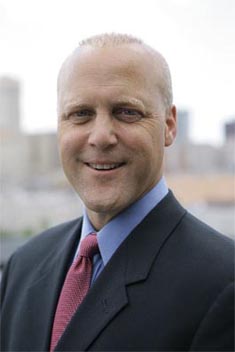
One of New Orleans' staunchest advocates is Louisiana's Lieutenant Governor, Mitch Landrieu. Though he has a vested interest as an elected official (and promoting tourism and economic development is part of his job), it goes without saying that New Orleans, his hometown, holds a special place in his heart. The son of former mayor, Moon Landrieu, and brother to U.S. Senator Mary Landrieu, Lt. Governor Landrieu found himself in the national spotlight this past summer when he ran for mayor in New Orleans against Ray Nagin. From the beginning, neither candidate differed greatly in their political views, but Mayor Nagin had been sharply criticised for his off-the-cuff remarks and blunt style. It came as a surprise to some voters that the controversial incumbent prevailed against the mild-mannered Landrieu.
Returning to Baton Rouge from the campaign trail, the Lieutenant Governor resumed his role in responding to the needs of post-Katrina Louisiana, and New Orleans has especially benefited from some of Landrieu's initiatives. A recently published report card indicates many successes, but the Lieutenant Governor's Office concedes that some of its objectives remain unfulfilled. Many of these tasks are expected to be accomplished in the near future.
Returning to Baton Rouge from the campaign trail, the Lieutenant Governor resumed his role in responding to the needs of post-Katrina Louisiana, and New Orleans has especially benefited from some of Landrieu's initiatives. A recently published report card indicates many successes, but the Lieutenant Governor's Office concedes that some of its objectives remain unfulfilled. Many of these tasks are expected to be accomplished in the near future.
Photograph courtesy of the Office of the Lieutenant Governor, Louisiana
The son of former New Orleans mayor, Moon Landrieu, and brother to U. S. Senator Mary Landrieu, Mitch Landrieu is currently Louisiana's Lieutenant Governor.
Recently, Southern Edition was privileged to pose some questions to Lt. Governor Landrieu, and his answers provide much insight into his state's extensive recovery from the storms. Landrieu talks candidly about the problems he believes Louisiana and our nation could better address, but he avoids pointing fingers at Washington and offers no critique of leaders like Mayor Nagin. It is evident that Landrieu thoroughly understands his fellow Louisianans, and he briefly shares some of the positive things he witnessed firsthand during the aftermath of Hurricane Katrina.
Greg Freeman: A year has passed since Hurricane Katrina slammed the Gulf Coast. Without question, storm-ravaged New Orleans and other portions of southern Louisiana are facing a long road to recovery. With so many negative reports surfacing recently about the recovery, is the media, in your view, telling the full story? Or, has some major progress been made?
Mitch Landrieu: From a tourism perspective, the Louisiana experience that visitors know and love is alive and well. Significant progress has been made. I'll use the Superdome as an example.
Greg Freeman: A year has passed since Hurricane Katrina slammed the Gulf Coast. Without question, storm-ravaged New Orleans and other portions of southern Louisiana are facing a long road to recovery. With so many negative reports surfacing recently about the recovery, is the media, in your view, telling the full story? Or, has some major progress been made?
Mitch Landrieu: From a tourism perspective, the Louisiana experience that visitors know and love is alive and well. Significant progress has been made. I'll use the Superdome as an example.
On Monday, September 25, the Louisiana Superdome re-opened before a national audience, bringing more than 70,000 cheering fans to their feet and sending the message to the world that our state is ready for business. This was no accident.
This great victory was evidence of high performance on the part of the Louisianans charged with the monumental task of restoring the Superdome. 4,000 tons of trash and debris were removed. 3.8 million gallons of water were extracted. 9.7 acres of roof were fully replaced. Today, the Superdome is a world-class facility---built back better than before. All of this was accomplished ahead of schedule, on budget and with Louisiana contractors.
This great victory was evidence of high performance on the part of the Louisianans charged with the monumental task of restoring the Superdome. 4,000 tons of trash and debris were removed. 3.8 million gallons of water were extracted. 9.7 acres of roof were fully replaced. Today, the Superdome is a world-class facility---built back better than before. All of this was accomplished ahead of schedule, on budget and with Louisiana contractors.
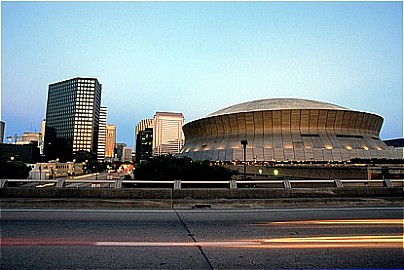
Photograph by Richard Nowitz
Leaders at the Superdome proved that Louisiana is well-equipped to deliver a strong return on investment with recovery dollars. As "The Dome" was resurrected, not one penny was wasted on fraud or abuse. As a result, an iconic facility was put back into commerce, significantly contributing to the economic recovery of Louisiana.
People say that we could not have bought better publicity for our state. The largest audience in ESPN's history witnessed the strength of our city's spirit and listened as announcers repeatedly encouraged viewers to visit Louisiana. This too was no accident.
Speaking with one voice and pulling in one direction, the tourism industry mounted nothing short of a grassroots campaign to get our message out during the game. The Saints, the NFL and ESPN all understood what this night meant for the state.
Greg: You spearheaded the Louisiana Rebirth plan. Could you provide a brief synopsis of the program and state how well you think it is working?
Mitch: In the immediate aftermath of hurricanes Katrina and Rita, I brought together national experts and stakeholders from across the state to develop a strategic plan, Louisiana Rebirth: Restoring the Soul of America. This plan has guided the recovery of Louisiana's tourism and cultural industries, which are critical to our state's economic recovery. As the state's second strongest industry prior to the storms, tourism makes a $9.9 billion economic impact, employing 126,000 workers and generating $600 million in state and local taxes and, the cultural economy was the fastest growing sector of the state's economy, accounting for 144,000 jobs.
I'm pleased to report that tourism and cultural have spoken with one voice and that we are hitting the marks established in our strategic plan.
People say that we could not have bought better publicity for our state. The largest audience in ESPN's history witnessed the strength of our city's spirit and listened as announcers repeatedly encouraged viewers to visit Louisiana. This too was no accident.
Speaking with one voice and pulling in one direction, the tourism industry mounted nothing short of a grassroots campaign to get our message out during the game. The Saints, the NFL and ESPN all understood what this night meant for the state.
Greg: You spearheaded the Louisiana Rebirth plan. Could you provide a brief synopsis of the program and state how well you think it is working?
Mitch: In the immediate aftermath of hurricanes Katrina and Rita, I brought together national experts and stakeholders from across the state to develop a strategic plan, Louisiana Rebirth: Restoring the Soul of America. This plan has guided the recovery of Louisiana's tourism and cultural industries, which are critical to our state's economic recovery. As the state's second strongest industry prior to the storms, tourism makes a $9.9 billion economic impact, employing 126,000 workers and generating $600 million in state and local taxes and, the cultural economy was the fastest growing sector of the state's economy, accounting for 144,000 jobs.
I'm pleased to report that tourism and cultural have spoken with one voice and that we are hitting the marks established in our strategic plan.
Our first test was Mardi Gras. Could we pull it off successfully? Should we have it at all with so many people still displaced? The answer was yes. Mardi Gras 2006 was a family reunion of sorts, reuniting families along parade routes throughout Orleans, Jefferson and St. Bernard parishes. Mardi Gras also became an important opportunity to use the national and international media to tell the ongoing story of Louisiana's recovery and rebuilding.Our next test was the New Orleans Jazz and Heritage Festival. With the site of the festival severely damaged by the storms, it seemed nearly impossible to host the world's largest annual musical festival in 2006. Due to the hard work of many committed to rebuilding the cultural economy, Jazz Fest was able to host nearly 350,000 people.
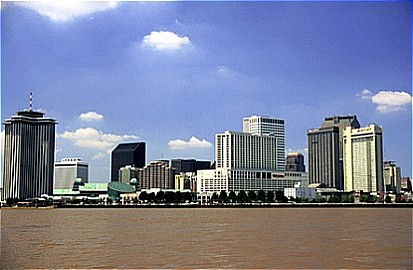
Photograph by Richard Nowitz
Simultaneously, the Zurich Classic PGA Golf Tournament also served dual purposes, by attracting thousands of golf enthusiasts and corporate executives and government officials from across the country. The event put tourism dollars in city and state coffers and secured corporate business commitments essential for Louisiana's recovery.
Greg: Victims of Katrina have shared stories that range from heart-wrenching agony and utter despair to courageous acts and outright miracles. From your own observations, what images or events stand out in your mind? Twenty years from now, what do you think you will remember most?
Mitch: After the storms, I saw people coming together to find higher common ground. I bore witness to the great American spirit of service. Let me tell you what I saw on the ground.
I saw neighbor helping neighbor. I saw young African American men bringing elderly white women to safety. I saw white men carrying young African American children from rooftops. We understood that we were all in the same boat.
I saw our first responders and the Louisiana Coast Guard work back-to-back-to-back shifts for 15 days straight---risking their lives to save others. I saw wildlife and fisheries agents and everyday citizens put their boats in the water and steer directly into harm's way to save their fellow citizens.
In all, more than 6,000 people were rescued from the floodwaters.
I saw volunteers manning emergency shelters. I saw faith-based groups feeding the hungry. I saw people opening their homes.
Greg: Some speculate that the economies of New Orleans and South Louisiana will soon be impacted primarily by a construction boom. However, we all know that tourism has always been such an integral part of Louisiana. What measures have been taken to ensure that tourism is adequately promoted and cultivated? Do you think convention-goers and tourists alike are still cautious or hesitant about returning to the area? Should they be?
Mitch: Louisiana is an international competitor in tourism, and this industry is an integral part of our state's economy. A strong economy is a diverse economy, so tourism is encouraged by good news from the state's construction industry, oil and gas, ports, aerospace and bio med.
We learned from the national tourism leaders who helped with the New York City rebound effort post-9/11. The Lower Manhattan Corporation reported that marketing is the key to rebuilding credibility with your customer base, which may now have fears about visiting the impacted areas.
Greg: Victims of Katrina have shared stories that range from heart-wrenching agony and utter despair to courageous acts and outright miracles. From your own observations, what images or events stand out in your mind? Twenty years from now, what do you think you will remember most?
Mitch: After the storms, I saw people coming together to find higher common ground. I bore witness to the great American spirit of service. Let me tell you what I saw on the ground.
I saw neighbor helping neighbor. I saw young African American men bringing elderly white women to safety. I saw white men carrying young African American children from rooftops. We understood that we were all in the same boat.
I saw our first responders and the Louisiana Coast Guard work back-to-back-to-back shifts for 15 days straight---risking their lives to save others. I saw wildlife and fisheries agents and everyday citizens put their boats in the water and steer directly into harm's way to save their fellow citizens.
In all, more than 6,000 people were rescued from the floodwaters.
I saw volunteers manning emergency shelters. I saw faith-based groups feeding the hungry. I saw people opening their homes.
Greg: Some speculate that the economies of New Orleans and South Louisiana will soon be impacted primarily by a construction boom. However, we all know that tourism has always been such an integral part of Louisiana. What measures have been taken to ensure that tourism is adequately promoted and cultivated? Do you think convention-goers and tourists alike are still cautious or hesitant about returning to the area? Should they be?
Mitch: Louisiana is an international competitor in tourism, and this industry is an integral part of our state's economy. A strong economy is a diverse economy, so tourism is encouraged by good news from the state's construction industry, oil and gas, ports, aerospace and bio med.
We learned from the national tourism leaders who helped with the New York City rebound effort post-9/11. The Lower Manhattan Corporation reported that marketing is the key to rebuilding credibility with your customer base, which may now have fears about visiting the impacted areas.
We quickly mobilized an aggresive national media campaign to invite people around the world to "Come Fall in Love with Louisiana All Over Again." We enlisted some of Louisiana's most recognizable citizens to be our spokespersons---Chef Emeril Lagasse, Jazz great Wynton Marsalis, Actors Patricia Clarkson and John Goodman. This ad campaign is the largest in Louisiana's history.
This past June, New Orleans hosted the American Library Association as the first major convention post-Katrina. ALA President Michael Gorman called the 18,000+ person conference a "smashing success." Gorman noted that 35 organizations were monitoring this conference to determine if New Orleans was up for the challenge and said, "Unless those people are crazy, they are going back to their associations and telling them that New Orleans is a wonderful place to have a convention."
This past June, New Orleans hosted the American Library Association as the first major convention post-Katrina. ALA President Michael Gorman called the 18,000+ person conference a "smashing success." Gorman noted that 35 organizations were monitoring this conference to determine if New Orleans was up for the challenge and said, "Unless those people are crazy, they are going back to their associations and telling them that New Orleans is a wonderful place to have a convention."
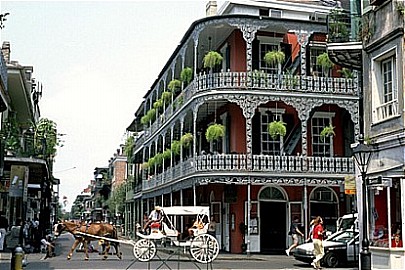
Photograph by Carl Purcell
Greg: Louisiana comprises a diverse group of people. Its citizens are resilient, steeped in tradition and culture and blessed with an abundance of creativity. As a Louisianan, how do you characterize your fellow citizens?
Mitch: Louisiana's heritage is a gumbo of native Americans and exiles from Acadia in Canada, French expatriates and French Creoles, Creoles of color, freed people of color and Americans. Tradition, family, food, music, and joie de vivre are fundamental here. The people and culture of Louisiana are unique and authentic, and have a profound influence on American culture and commerce.
Louisiana is America's greatest cultural destination, and is what we call "The Soul of America." It's a place that could be foreign to Americans and American to foreigners - a place that captures rich and diverse cultures in language, food, architecture, politics, art, music, and so much more and blends it all together like great jazz.
Greg: What lessons have been learned from Hurricane Katrina? Has the disaster made the state stronger and better prepared for the next storm?
Louisiana is America's greatest cultural destination, and is what we call "The Soul of America." It's a place that could be foreign to Americans and American to foreigners - a place that captures rich and diverse cultures in language, food, architecture, politics, art, music, and so much more and blends it all together like great jazz.
Greg: What lessons have been learned from Hurricane Katrina? Has the disaster made the state stronger and better prepared for the next storm?
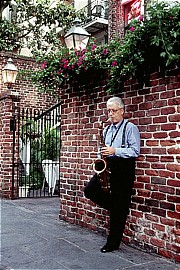
Photograph by Richard Nowitz
Mitch: We must address issues of emergency preparedness and response. We must vastly improve our emergency response system that includes: better communications technology; a clearer chain-of-command that lays out roles and responsibilities of every branch of government to get resources where they are needed immediately; and, a reorganization of the way that FEMA acts and reacts in a systematic way to prioritize saving lives and human capital.
Greg: There is much talk of persistent racial division-especially in New Orleans-where the poverty-stricken are predominantly minorities. In your opinion, overall, have these folks been neglected by FEMA and other applicable local, state or federal agencies? Arguably, the poor felt the brunt of this disaster and were among the least able to join the pre-Katrina exodus. And, while personal choices and circumstances can contribute to one's financial situation, what roles do you think Louisiana or New Orleans can/should play in ensuring that the poorest citizens are given the means to overcome their poverty and better weather future storms?
Mitch: Like it or not, the time has come for Americans to look at ourselves in the mirror and focus on a picture that we have long tried to ignore.
Today, over 37 million of our Americans live in poverty. Katrina made the nation come face-to-face with the stark reality that, regardless of race, financial means divide us as a country in a way that prevents us from truly recognizing the needs of our neighbors at some of the most vital times of life.
Katrina taught the nation a valuable lesson. We must not let the social disaster of poverty continue. What we really saw was the impact of poverty on an entire nation, and we saw it here in the United States.
Race and poverty are not issues that are unique to New Orleans or the South. But it is our time in the South to lead. Inside the policies we enact and the decisions we make are solutions. It is our job to seek them out and provide the necessary resources and work to enact them.
It starts with education.
Imagine the opportunity we have to rebuild a public education system that was failing our students, our teachers, our economy and all those who lived and worked within the community.
Think about the possibility of what can be if we use this opportunity to make our schools technological and cultural centers within our communities.
Why can't we design and build modern learning centers that enhance teaching and learning and that also function as playgrounds and neighborhood parks, community theatre centers, art galleries and health centers?
Why can't we coordinate with the city or parish libraries to put libraries in schools that serve their communities?
Why can't schools be designed to provide cultural, artistic, recreation and other opportunities for our families?
Greg: Do you feel that the federal government has failed miserably in its response to New Orleans? Do you fault the Bush Administration or bureaucratic red tape? If the Lower Ninth Ward had been Manhattan, do you think we would be having this discussion?
Mitch: Hurricanes Katrina and Rita were American tragedies that deserve an American response. Looking forward, we have to fix a broken emergency response system.
Greg: In the near future, do you have other political aspirations that you might care to elaborate on at this time?
Mitch: I am focused on rebuilding the tourism and cultural industries of Louisiana, and will run for re-election as Lt. Governor.
Greg: When the history books are written, what would you like for subsequent generations to remember about you and your service to Louisiana-especially during and directly after Hurricane Katrina?
Mitch: My service is guided by five governing principles: Our diversity is a strength, not a weakness; we must work to expand and diversify Louisiana's economy; we must work regionally to compete globally; we must add value to raw material, native talent and intellectual capital; and, we must set our goals to international standards, not the southern average.
My team has rejected the efforts to divide and stayed united behind a single desire to rebuild Louisiana as a great place to live, work and play. We as a people---come hell or high water, and we've had both---are going to find a way to reach higher common ground. I believe we have an opportunity to put away the twin cousins of race and poverty and replace them with the siblings of opportunity and responsibility.
Greg: There is much talk of persistent racial division-especially in New Orleans-where the poverty-stricken are predominantly minorities. In your opinion, overall, have these folks been neglected by FEMA and other applicable local, state or federal agencies? Arguably, the poor felt the brunt of this disaster and were among the least able to join the pre-Katrina exodus. And, while personal choices and circumstances can contribute to one's financial situation, what roles do you think Louisiana or New Orleans can/should play in ensuring that the poorest citizens are given the means to overcome their poverty and better weather future storms?
Mitch: Like it or not, the time has come for Americans to look at ourselves in the mirror and focus on a picture that we have long tried to ignore.
Today, over 37 million of our Americans live in poverty. Katrina made the nation come face-to-face with the stark reality that, regardless of race, financial means divide us as a country in a way that prevents us from truly recognizing the needs of our neighbors at some of the most vital times of life.
Katrina taught the nation a valuable lesson. We must not let the social disaster of poverty continue. What we really saw was the impact of poverty on an entire nation, and we saw it here in the United States.
Race and poverty are not issues that are unique to New Orleans or the South. But it is our time in the South to lead. Inside the policies we enact and the decisions we make are solutions. It is our job to seek them out and provide the necessary resources and work to enact them.
It starts with education.
Imagine the opportunity we have to rebuild a public education system that was failing our students, our teachers, our economy and all those who lived and worked within the community.
Think about the possibility of what can be if we use this opportunity to make our schools technological and cultural centers within our communities.
Why can't we design and build modern learning centers that enhance teaching and learning and that also function as playgrounds and neighborhood parks, community theatre centers, art galleries and health centers?
Why can't we coordinate with the city or parish libraries to put libraries in schools that serve their communities?
Why can't schools be designed to provide cultural, artistic, recreation and other opportunities for our families?
Greg: Do you feel that the federal government has failed miserably in its response to New Orleans? Do you fault the Bush Administration or bureaucratic red tape? If the Lower Ninth Ward had been Manhattan, do you think we would be having this discussion?
Mitch: Hurricanes Katrina and Rita were American tragedies that deserve an American response. Looking forward, we have to fix a broken emergency response system.
Greg: In the near future, do you have other political aspirations that you might care to elaborate on at this time?
Mitch: I am focused on rebuilding the tourism and cultural industries of Louisiana, and will run for re-election as Lt. Governor.
Greg: When the history books are written, what would you like for subsequent generations to remember about you and your service to Louisiana-especially during and directly after Hurricane Katrina?
Mitch: My service is guided by five governing principles: Our diversity is a strength, not a weakness; we must work to expand and diversify Louisiana's economy; we must work regionally to compete globally; we must add value to raw material, native talent and intellectual capital; and, we must set our goals to international standards, not the southern average.
My team has rejected the efforts to divide and stayed united behind a single desire to rebuild Louisiana as a great place to live, work and play. We as a people---come hell or high water, and we've had both---are going to find a way to reach higher common ground. I believe we have an opportunity to put away the twin cousins of race and poverty and replace them with the siblings of opportunity and responsibility.
All photographs courtesy of the New Orleans Metropolitan Convention & Visitors Bureau, Inc. unless otherwise stated.
BIBLIOGRAPHY
Dan Baum, "The Lost Year: Behind the failure to rebuild," The New Yorker, August 21, 2006.
Bob Dart, "New Orleans Mayor: It's Nagin again in Big Easy," Atlanta Journal-Constitution, May 21, 2006.
OTHER SOURCES
Electronic mail communication with Emily Sneed, Office of Lieutenant Governor Mitch Landrieu, Baton Rouge, on behalf of Lieutenant Governor Landrieu on October 13, 2006
Dan Baum, "The Lost Year: Behind the failure to rebuild," The New Yorker, August 21, 2006.
Bob Dart, "New Orleans Mayor: It's Nagin again in Big Easy," Atlanta Journal-Constitution, May 21, 2006.
OTHER SOURCES
Electronic mail communication with Emily Sneed, Office of Lieutenant Governor Mitch Landrieu, Baton Rouge, on behalf of Lieutenant Governor Landrieu on October 13, 2006
Author: Greg Freeman. Published November 20, 2006.
Copyright
Southern Edition
All Rights Reserved
Southern Edition
All Rights Reserved
All materials contained on this site, including text and images, are protected by copyright laws and may not be reproduced without prior written permission from the publisher. Where applicable, use of some items contained on this site may require permission from other copyright owners.
Fair Use of text from SouthernEdition.com is permitted to the extent allowed by copyright law. Proper citation is requested. Please use this guide when citing a Southern Edition article.
Contact Greg Freeman or SouthernEdition.comFair Use of text from SouthernEdition.com is permitted to the extent allowed by copyright law. Proper citation is requested. Please use this guide when citing a Southern Edition article.